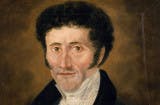German writer, conductor, composer. One of the most famous representatives of German romanticism. 1792–95 studied law at the Royal University. He studied music in Kraniausi and Berlin (with J.F. Reichardt). 1796-1802 worked as a lawyer in Glogau, Berlin, Poznań; later exiled to Plock for caricatures of Prussian officers. In 1804 he moved to Warsaw. Until 1807, he organized (with the composer J. Elsner) symphonic concerts and conducted them. In 1808 and 1810-12, he worked as a theater director in Bamberg, composed music, and was famous as a music critic (articles from 1809-15 were printed in the newspaper Allgemeine musikalische Zeitung). In 1813-14 he conducted the theater troupe orchestra in Leipzig and Dresden. From 1814, an official of the Prussian courts. In 1815, he changed his third name in honor of W. A. Mozart.
In his stories Hoffmann skillfully combined wild flights of imagination with vivid and convincing examinations of human character and psychology. The weird and mysterious atmosphere of his maniacs, spectres, and automata thus intermingles with an exact and realistic narrative style. The struggle within Hoffmann between the ideal world of his art and his daily life as a bureaucrat is evident in many of his stories, in which characters are possessed by their art. His use of fantasy, ranging from fanciful fairy tales to highly suggestive stories of the macabre and supernatural, served as inspiration to several operatic composers. Richard Wagner drew on stories from Die Serapionsbrüder for Die Meistersinger von Nürnberg (1868), as did Paul Hindemith in Cardillac (1926) and Jacques Offenbach in The Tales of Hoffmann (1881), in which Hoffmann himself is the central figure. The ballet Coppélia (1870), by Léo Delibes, is also based on a Hoffmann story, as is Pyotr Ilyich Tchaikovsky’s ballet suite, The Nutcracker (1892).
